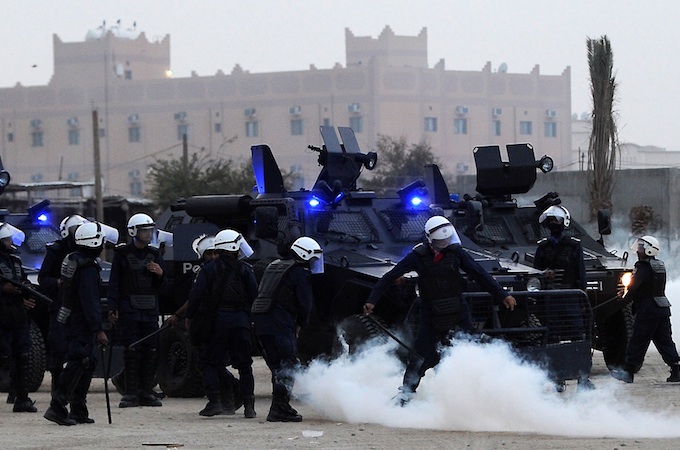Bahrain monarchy losing all credibility: Expert

 Bahrain’s ruling al-Khalifa monarchy is unstable and has lost all credibility, resorting to force instead of dialogue during the ongoing crisis, a political analyst tells Press TV.
Bahrain’s ruling al-Khalifa monarchy is unstable and has lost all credibility, resorting to force instead of dialogue during the ongoing crisis, a political analyst tells Press TV.
The background of the story follows massive protests which broke out in February 2011, as people took to the streets and called for a constitutional monarchy — a demand that later turned into calls for the ouster of the monarchy. The Bahraini government promptly launched a brutal crackdown on the peaceful protests and called in Saudi-led Arab forces from neighboring Persian Gulf states.
Press TV has conducted an interview with Colin Cavell, a former assistant professor at the University of Bahrain, from West Virginia, to further discuss the issue. Cavell is joined by Saeed Shehabi, Bahrain Freedom Movement, from London, and Jim W. Dean, managing editor and columnist at Veterans Today, from Georgia. The following is a rough transcription of the interview.
Press TV: The question here would be whether the al-Khalifa regime would be willing to release the prisoners…The speech that our guest [Mr. Jim W. Dean] there in Georgia was referring to by the crown prince, in that speech, Mr. Cavell, he said that Bahrain needed to work harder on judicial reform to ensure policing that was equal to all Bahrainis. Some are now interpreting this as the regime softening its positions. Do you think it is?
Cavell: Homa, my answer is no because the regime has lost all credibility. It is backed into a corner and now it is relying solely upon military force in order to stay in power.
In other words, it is no longer what political scientists call a government, per se. It is a military junta. It has lost credibility. It has lost trust. No one in the population believes what they say.
…They will have talks as long as they are put through a referendum. Any decisions made, you can be sure that the regime will not allow that to happen.
Press TV: The issue is right now many have been accusing the West – especially the US – of pursuing double standards when it comes to what’s happening in Bahrain and what’s happening in Syria. They say that the US’ stance is hypocritical over the revolutions in the Arab world.
Do you think this is one of the reasons why we’re hearing these comments being made, for instance, by the deputy US secretary of state there when he says that it’s asking Bahrain to prosecute those who it says have violated human rights?
Cavell: Homa, the US knows that the regime in Bahrain cannot continue. It is unstable. It has lost complete legitimacy and it will have to be transitioned out.
Right now with the reelection of President Obama, they are reorganizing the policy. They have to deal with Egypt and Syria first, but you can be sure that the Bahrain kingdom is definitely on the agenda and that they are just buying time…
Press TV: A lot of reports are still calling this a protest movement led by the majority Shia against the Sunni-ruled kingdom. Even the UK Foreign Secretary William Hague called it in his words “sectarian tension”. But is that a comprehensive picture of the crisis? And what basically makes a popular movement, a sectarian conflict and a revolution?
Cavell: Homa, the divide-and-conquer strategy of the al-Khalifa is to say this is a sectarian conflict inspired from afar. But it is not. One of the main opposition leaders is Ibrahim Sharif and he like many other opposition leaders are in jail.
So, the al-Khalifa junta puts the opposition leaders in jail even though they are comprised of Sunnis, Shias and many others. They claim this as a sectarian conflict simply to try to divert attention from the foreigners.
But most Bahrainis know that they’re united against the monarchy, the 230-year-old autocratic dictatorship, and they want the al-Khalifa junta to leave.







